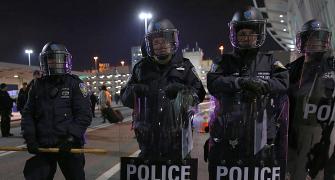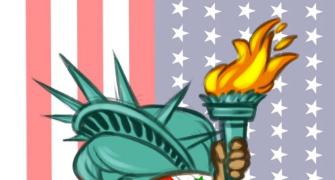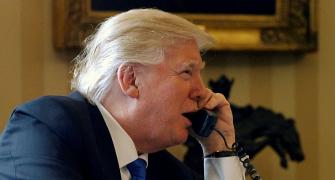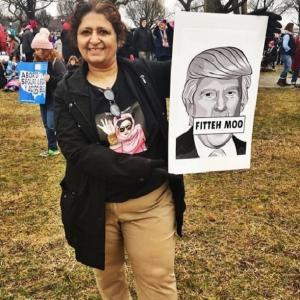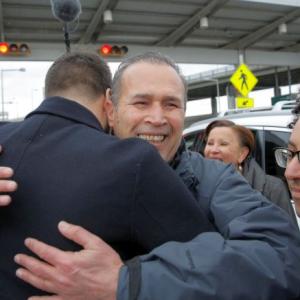The new executive order, which will come into force on March 16, covers people from Sudan, Syria, Iran, Libya, Somalia, and Yemen.

United States President Donald Trump on Monday signed a revised executive order, temporarily halting entry to the US for people from six Muslim-majority nations while dropping Iraq from the list, after his original order was blocked by the courts and triggered global anger.
White House Press Secretary Sean Spicer confirmed that Trump signed the order behind closed doors “this morning”.
The latest executive order specifies that a 90-day ban on people from Sudan, Syria, Iran, Libya, Somalia, and Yemen does not apply to those who already have valid visas.
Any individual who had a valid visa either on January 27, 2017 (prior to 5:00 pm) or holds a valid visa on the effective date of the Executive Order is not barred from entry into the US, according to the order.
“The 90-day period will allow for proper review and establishment of standards to prevent terrorist or criminal infiltration by foreign nationals,” it says.
The new order drops Iraq’s name from the list of targeted countries, saying Baghdad has agreed to increase cooperation with the US on the vetting of its citizens applying for a visa to travel to America.
“Iraqi citizens are not affected by the Executive Order,” says the order which will come into force on March 16.
The Refugee Admissions Program will also be temporarily suspended for the next 120 days while Department of Homeland Security and interagency partners review screening procedures to ensure refugees admitted in the future do not pose a security risk to the US, the new order says.

The Federal Bureau of Investigation is currently investigating 300 individuals admitted to the US as refugees for potential terrorism related activities.
Officials hope that this time it will be a very orderly process and there would be no chaos at port of entry. Those people who are travelling on valid visas and arrive at a US port of entry will still be permitted to seek entry into the United States.
US President Trump has also directed the State Department and the DHS to make recommendation of any country that could be included in the future suspension of entry into the US.
Homeland Security Secretary John F Kelly said the executive order signed on Monday will make America safer, and address long-overdue concerns about the security of our immigration system.
“We must undertake a rigorous review of our visa and refugee vetting programs to increase our confidence in the entry decisions we make for visitors and immigrants to the US. We cannot risk the prospect of malevolent actors using our immigration system to take American lives,” he said.
In the first 20 days, the DHS will perform a global, country-by-country review of the identity and security information that each country provides to the US to support US visa and other immigration benefit determinations.
If you have a current valid visa to travel, we welcome you. But unregulated, unvetted travel is not a universal privilege, especially when national security is at stake
Countries will then have 50 days to comply with requests from the US government to update or improve the quality of the information they provide.
When the suspension is lifted, the number of refugees allowed into the US will be capped at 50,000 for the fiscal year 2017.
Stating that the US immigration system has been repeatedly exploited by terrorists and other malicious actors, the executive order says it will ensure that the US can conduct a thorough and comprehensive analysis of the national security risks posed from its immigration system.
Trump had signed an executive order on January 27 imposing an indefinite travel ban on Syrian refugees and a temporary curb on people from Iran, Iraq, Libya, Sudan, Yemen and Somalia -- from entering the US for at least 90 days.
The move triggered worldwide outrage and widespread protests at home and abroad. Protests broke out in several US cities and thousands of people demonstrated at many airports.
There was chaos in the first days of its implementation, as people arriving at US airports from targeted countries were detained and sometimes sent back to where they came from.
More than 100 academics from Texas colleges and universities signed a petition against the travel ban.
A federal judge in Seattle suspended the order, and a federal appeals court in San Francisco refused to reinstate it, leading Trump administration to come up with this revised version.
Trump had criticised the court order suspending the ban as “a very bad decision, very bad for the safety and security of our country. The rollout was perfect”.

The new order is meant to address complaints raised by the federal judges that parts of the first version of the executive order were unconstitutional.
Iraq has agreed to timely return and repatriation of its nationals who are subject to removal.
Kelly said the executive order signed on Monday is prospective in nature -- applying only to foreign nationals outside of the United States who do not have a valid visa.
“It is important to note that nothing in this executive order affects current lawful permanent residents or persons with current authorisation to enter our country. If you have a current valid visa to travel, we welcome you. But unregulated, unvetted travel is not a universal privilege, especially when national security is at stake,” he added.
The renewed ban on immigrants is “a vital measure for strengthening our national security,” said Secretary of State Rex Tillerson.
“To our allies and partners around the world, please understand this order is part of our ongoing efforts to eliminate vulnerabilities that radical Islamist terrorists can and will exploit for destructive ends,” he said.
The State Department will coordinate with other federal agencies and implement these temporary restrictions in an orderly manner, Tillerson said.
“Iraq is an important ally in the fight to defeat the Islamic State, with their brave soldiers fighting in close coordination with America’s men and women in uniform.
“This intense review over the past month identified multiple security measures that the State Department and the government of Iraq will be implementing to achieve our shared objective of preventing those with criminal or terroristic intent from reaching the US,” Tillerson said.
US Attorney General Jeff Sessions said, “We also know that people seeking to support or commit terrorist attacks here will try to enter through our refugee program. In fact, today more than 300 people who came here as refugees are under FBI investigation for potential terrorism- related activities”.
This executive order protects the American people -- as well as lawful permanent residents -- by putting in place an enhanced screening and vetting process for visitors from six nations, Sessions said, pointing out that like every nation, the US has the right to control who enters the country.
“Three of these nations are state sponsors of terrorism. The other three have served as safe havens for terrorists -- countries where the government has lost control of territory to terrorist groups like IS or Al Qaeda and its affiliates. This increases the risk that people admitted here from these countries may belong to terrorist groups, or may have been radicalised by them,” he said.
“We cannot compromise our nation’s security by allowing visitors entry when their own governments are unable or unwilling to provide the information we need to vet them responsibly -- or when those governments actively support terrorism. This executive order provides a needed pause, so we can carefully review how we scrutinise people coming here from these countries of concern,” he added.
The Department of Justice believes that this executive order, just as the first, is a lawful and proper exercise of presidential authority.
The Department of Justice will defend and enforce lawful orders of the president consistent with core principles of the Constitution. The executive is empowered under the Constitution and by Congress to make national security judgements and to enforce the immigration policies in order to safeguard the American public, he added.

